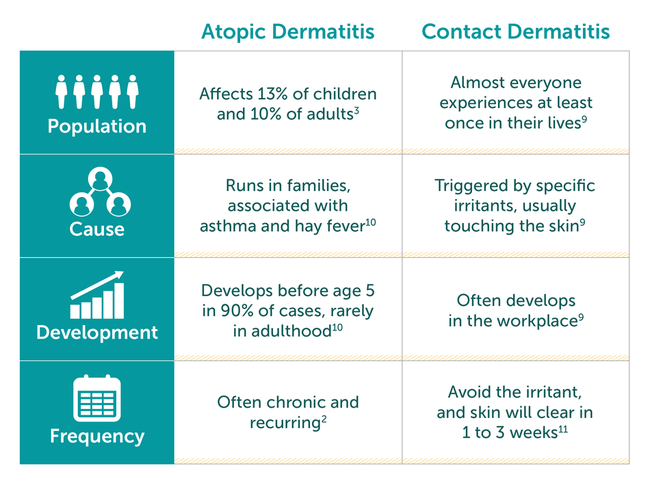
Quick Links
Resources
About MyEczemaTeam
Powered By






| KEY TAKEAWAYS: |
|
The word atopic comes from the ancient Greek words "a topos," literally “without place,” but in context meaning “unusual.” Ironically, atopic dermatitis is anything but unusual. In fact, atopic dermatitis is the most common type of eczema, affecting as many as 13 percent of children and 10 percent of adults in the United States.
Every type of eczema causes redness, scales, and itchy skin, and all eczema involves skin inflammation resulting from overactivation of the immune system. People with eczema tend to have a defective or “leaky” skin barrier that causes dry skin and lets in irritants and allergens.
Atopic dermatitis is considered a severe and long-lasting type of eczema. For many with atopic dermatitis, the condition has a significant impact on quality of life and can pose a substantial economic burden.

Different types of eczema have different triggers, symptoms, and treatments. If you have atopic dermatitis, gaining a better understanding of your skin condition can be a good first step to improving it.
Atopic dermatitis is more likely to be chronic and recurrent than other types of eczema. Some researchers believe atopic dermatitis is part of the “atopic triad” or “atopic march,” a genetic tendency to also develop asthma and allergic rhinitis (hay fever), food allergies, or other allergic conditions. In contrast, a review of existing studies on contact dermatitis have not found conclusive evidence of a genetic link or increased risk factors based on family history.
This chart shows a few key differences between atopic dermatitis and contact dermatitis, another common type of eczema. Unfortunately, it is possible to have more than one type of eczema at the same time. If your eczema worsens or fails to improve while correctly using treatments prescribed for atopic dermatitis, you may have contact dermatitis in addition to atopic dermatitis. It is possible to develop a contact allergy to medications for atopic dermatitis.
Unfortunately, it is possible to have more than one type of eczema at the same time. If your eczema worsens or fails to improve while correctly using treatments prescribed for atopic dermatitis, you may have contact dermatitis in addition to atopic dermatitis. It is possible to develop a contact allergy to medications for atopic dermatitis.
Atopic dermatitis is a chronic skin disease, and research indicates it is likely lifelong. Atopic dermatitis can be confusing because it is also episodic and intermittent — there may be years between flares. However, in people with atopic dermatitis, even skin that appears normal shows impaired skin barrier function and evidence of allergic and inflammatory changes.
 The good news is that there are many new medications for atopic dermatitis recently approved by the U.S. Food and Drug Administration (FDA) or in late stages of development. There are more options available for the treatment of atopic dermatitis now than ever before.
The good news is that there are many new medications for atopic dermatitis recently approved by the U.S. Food and Drug Administration (FDA) or in late stages of development. There are more options available for the treatment of atopic dermatitis now than ever before.
The bad news is that people living with atopic dermatitis often have trouble with treatment adherence, as it often involves daily treatments. Treatment adherence is defined as taking all prescribed medicines as directed for the length of time necessary. Adherence may be better for oral or injected medications than for topical treatments (applied directly to the skin).
Some common reasons for not adhering to atopic dermatitis treatment include:
Some people use their atopic dermatitis medication incorrectly, then decide it is not working. This sometimes results in switching to a more powerful medication when it is not really needed.
If you have difficulty affording your prescribed atopic dermatitis medication, taking medications as directed, or sticking to the schedule for phototherapy treatments, discuss these issues openly with your doctor. They may be able to recommend ways to overcome these obstacles. Your dermatologist, allergist, or family doctor can also help you weigh the risks and benefits of each medication if you are concerned about safety.
There are steps you can take each day to preserve your skin barrier and keep your skin its healthiest. Sticking to a good skin care regimen every day can help control atopic dermatitis and decrease the need for medications.
Basic skin care tips for people with atopic dermatitis include:
Bathing
| |
Moisturizing
| |
Environment
|
MyEczemaTeam is the social network for people with eczema and their loved ones. Here, more than 36,000 members from around the world come together to swap stories and advice, discuss daily life with eczema, and meet others who understand the diagnosis.
Do you have atopic dermatitis? Share your experience in the comments below or by posting on MyEczemaTeam.
Don’t miss the latest news, tips and treatment options.
Privacy Policy Kevin Berman, M.D., Ph.D. is a dermatologist at the Atlanta Center for Dermatologic Disease, Atlanta, GA. Review provided by VeriMed Healthcare Network. Learn more about him here.
Kevin Berman, M.D., Ph.D. is a dermatologist at the Atlanta Center for Dermatologic Disease, Atlanta, GA. Review provided by VeriMed Healthcare Network. Learn more about him here.
 Kelly Crumrin is a senior editor at MyHealthTeam and leads the creation of content that educates and empowers people with chronic illnesses. Learn more about her here.
Kelly Crumrin is a senior editor at MyHealthTeam and leads the creation of content that educates and empowers people with chronic illnesses. Learn more about her here.



Become a Subscriber
Get the latest articles about eczema sent to your inbox.